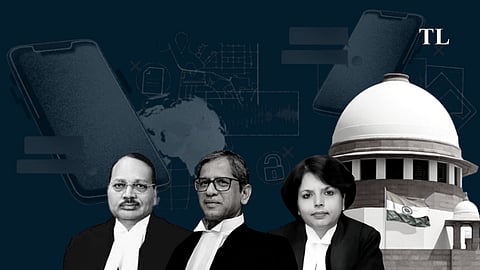

IN a significant development, the Supreme Court Wednesday formed a committee headed by former Supreme Court judge Justice R.V. Raveendran to probe the veracity of the allegations against the Central Government for its use of the Israeli software Pegasus to target activists, journalists, politicians, judges and government officials.
A three-judge bench of Chief Justice of India N.V. Ramana, Justices Surya Kant and Hima Kohli passed an order to this effect even as it disapproved of the stand taken by the union government to not disclose whether it had indeed used the Israeli software or not.
The Committee supervised by Justice Raveendran will be assisted by Alok Joshi, former IPS officer (1976 batch) and Dr Sundeep Oberoi, Chairman, Sub Committee in (International Organisation of Standardisation/ International Electro-Technical Commission/Joint Technical Committee).
Besides, it will have three technical members:
The Court said it was compelled to form the independent committee because:
The apex court fixed the terms of reference of the Committee to enquire, investigate and determine:
"The State cannot get a free pass every time by raising national security concerns. No omnibus prohibition can be called against judicial review", the top court said.
The apex court asserted that every citizen of India had to be given protection of their right to privacy. Freedom of the press can't be undermined by the invasion of the right to privacy, said CJI Ramana while reading out the Pegasus order.
The protection of journalistic sources is one of the basic conditions for the freedom of the press and without such protection, sources may be deterred from assisting the press in informing the public on matters of public interest, a three-judge bench said.
It said surveillance and the knowledge that one is under the threat of being spied on can affect the way an individual decides to exercise their rights. Such a scenario, the court said, might result in self-censorship. This is one of particular concern when it relates to the freedom of the press, which is an important pillar of democracy.
"Such a chilling effect on the freedom of speech is an assault on the vital public watchdog role of the press, which may undermine the ability of the press to provide accurate and reliable information", the apex court said.
The union government had informed the court that it did not want to file a detailed affidavit in the matter. Whether the government used a particular software for authorized interception could not be the subject matter of a court debate, Solicitor General Tushar Mehta said, reiterating that the government was willing to constitute a committee of domain experts which could go into the issue.
Mehta urged the court to appreciate the harm it could cause to national security if the government was to disclose whether a particular software was used or not.
Senior Advocate Kapil Sibal, who was appearing for senior journalists N. Ram and Sashi Kumar, argued that withholding information from the court on whether Pegasus was used would be detrimental to the essential task of protecting fundamental rights, and would be destructive of Article 32 of the Constitution. He cited the decision of the top court in Ram Jethmalani & Ors vs. Union Of India (2011), popularly known as the 'Black Money case', in which it was held that the State had the duty, generally, to reveal all the facts and information in its possession to the court, and also provide the same to the petitioners.
Sibal opposed the formation of a committee by the government when the allegations are against the government itself.
Senior Advocate Shyam Divan, appearing for some of the petitioners, filed the opinion of experts to say "Pegasus is not only a surveillance mechanism but also an implant mechanism which can be used to implant false data".
No law as of now authorizes such kind of snooping, Divan argued.
Senior advocates Dinesh Dwivedi, Rakesh Dwivedi, Meenakshi Arora and Colin Gonsalves also briefly argued similarly, and urged the court to have the matter probed by an independent agency.
Earlier, an officer of the rank of the Additional Secretary in the Ministry of Electronics and Information Technology had filed an affidavit denying the allegations made in the petitions, stating that the petitions were all based on conjecture and surmise, or on unsubstantiated media reports, or incomplete or uncorroborated material, and could, therefore, not be the basis for invoking the writ jurisdiction of the court.
The Ministry, however, said to dispel the "wrong narrative" spread by certain vested interests and with the object of examining the issues raised, the Union of India would constitute a Committee of Experts in the field to look into all aspects of the matter.
The affidavit did not find favour, both with the court as well as the petitioners, as it failed to state unequivocally whether the union government purchased the Pegasus software at all. The court offered an opportunity to the Centre to decide whether it would file a detailed affidavit.
As part of the Pegasus Project revelations in July, The Wire reported that over 300 Indian individuals, which includes politicians, lawyers, activists and journalists were among a list of 50,000 for cyber-surveillance targets across the world, as their phones were either hacked or identified for snooping. This was done with the help of Pegasus, the phone hacking software developed by NSO Group, an Israeli tech company.
Following this, several petitions were filed in the Supreme Court by, among others, Rajya Sabha MP John Brittas, Director of the Hindu Group of publications N. Ram, founder of the Asianet TV channel Sashi Kumar, the Editors Guild of India, journalists Paranjoy Guha Thakurta, S.N.M. Abdi, Prem Shankar Jha, Rupesh Kumar Singh and Ipsa Shatakshi, advocate M.L. Sharma, and former Union Minister Yashwant Sinha.